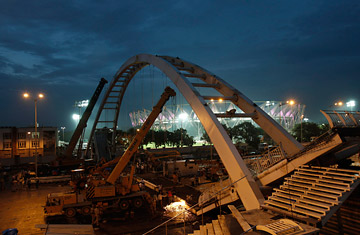
Cranes work at the site of a footbridge that collapsed outside the Jawaharlal Nehru stadium in New Delhi on Sept. 21, 2010
The 2010 Commonwealth Games in New Delhi may have been intended to showcase India as a cosmopolitan emerging economic powerhouse, but with just 11 days to go, the event threatens to become a debacle of epic proportions. The collapse of a footbridge outside the flagship Jawaharlal Nehru stadium on Tuesday (which injured 30 people) and the caving-in of the ceiling at the Games' weightlifting venue the following day appeared to symbolize the end of India's dream of hosting the "best ever" Commonwealth Games. Advanced parties dispatched to the venues by a number of participating countries have been so outraged by the hygiene and safety conditions at the athletes' village that they have threatened to withdraw from the event, and Commonwealth Games Federation President Michael Fennel will on Thursday hold emergency talks with India's Prime Minister, Manmohan Singh, in the hope of saving the Games from degenerating into a farce. But Indian officials believe the complaints are wildly exaggerated, and some say unrealistic standards are being demanded of the organizers.
Indian organizers of the event are annoyed at Fennel, who they believe has changed his tone under pressure from some of the key participating countries. His previously upbeat assessment of preparations as recently as a month ago gave way to a harshly critical tone in a letter addressed by Fennel to India's Cabinet Secretary K.M. Chandrasekhar, appointed last month by the Prime Minister to oversee the Games' preparation after a litany of corruption allegations.
Many of the countries whose advanced parties have visited the athletes' facility have warned that "the Commonwealth Games Village is seriously compromised," Fennel wrote on Monday. He changed his tone, a leading member of the Indian Organizing Committee alleged to TIME on conditions of anonymity, after some member associations denounced conditions inside the village as "unlivable." A meeting was held between the host committee and the Commonwealth Games Associations of Canada, New Zealand, Scotland, England and Wales on Sept. 16 and 17 to discuss the lack of "hygiene, cleanliness and preparedness" of the residential areas of the Games' village. The minutes of that meeting, which TIME has seen, do little to support the claims by Indian organizers that New Delhi's Commonwealth Games will rival Beijing's 2008 Olympics.
The minutes reflect New Zealand's representative refusing to allow their athletes to use "these dirty and unhygienic bathrooms," which the English delegates called "disgusting." And Scotland pointed out that stray dogs loitered freely around the residential areas and even soiled beds in which athletes are expected to sleep by next week. There were piles of rubbish around the 34 apartment towers, delegates at the meeting complained, and some plumbing and wiring was not operational, while some ground-floor apartments were flooded, and the standing water increased the risk of dengue fever — New Delhi is facing a major outbreak of the disease, which has infected 2,450 people so far.
With a number of countries having delayed the arrival of their teams because of the state of the athletes' village, Fennel warned that "timely acceptable solutions to prepare for the arrival of athletes are of paramount importance." But the Indian organizers seem unfazed.
Urban Development Minister Jaipal Reddy, who is also the head of the Group of Ministers on the Commonwealth Games, was dismissive. "There are complaints about cleanliness and maintenance, but these complaints are being addressed," said Reddy, whose ministry is responsible for most of the construction work around the Games, adding, "Some friends could be too finicky." Organizing Committee Secretary General Lalit Bhanot even suggested that the problem was a cultural difference in standards of hygiene. "These rooms are clean to both you and us," Bhanot told reporters. "However, it may not appear so to some others. They want certain standards in hygiene and cleanliness which may differ from our perception."
Chief Minister of Delhi Sheila Dixit couldn't understand the alarm raised by the bridge collapse. "The footbridge was not meant for athletes and delegates," she said on Tuesday. "It was for the use of common man." On Wednesday, she insisted that "minor hitches and glitches" would not prevent the Games from going ahead. But even as she was speaking, Scotland and Canada postponed the departure of their first parties of athletes for the Games, saying they hoped to give the organizers more time to address the problems.
New Zealand officials threatened to withdraw from the Games if the village is deemed uninhabitable on Oct. 3, when the tournament is scheduled to begin, and indicated that they would support the decision of individual athletes to stay home. Australia took a similar position. A number of high-profile athletes from England, Australia and Kenya have already withdrawn, citing health or security concerns, and more withdrawals are expected. Canada on Wednesday instructed its athletes to postpone plans to travel to India pending further review of conditions in New Delhi, and Wales took a similar stance.
Safety also remains a major concern for the 12-day sporting extravaganza. India's Central Vigilance Commission warned in August that the infrastructure built for the Games was in poor shape, chiefly because of "large-scale corruption, usage of substandard material and repeated delays." The report warned that the Games, expected to draw at least 150,000 spectators, could be hazardous for athletes and spectators. "There is no guarantee of quality of the work done for the Games," the report warned, because quality certificates for much of the completed work are suspect or faked. "Electrical mishaps cannot be ruled out."
The footbridge and weightlifting venue collapses appear to have confirmed the commission's premonitions. Even if it doesn't get any worse, the shambles on display this week suggest that India's best hopes for the Games have been sabotaged by corrupt and bungling officials.
Sumon K. Chakrabarti is the chief national correspondent for CNN-IBN.
